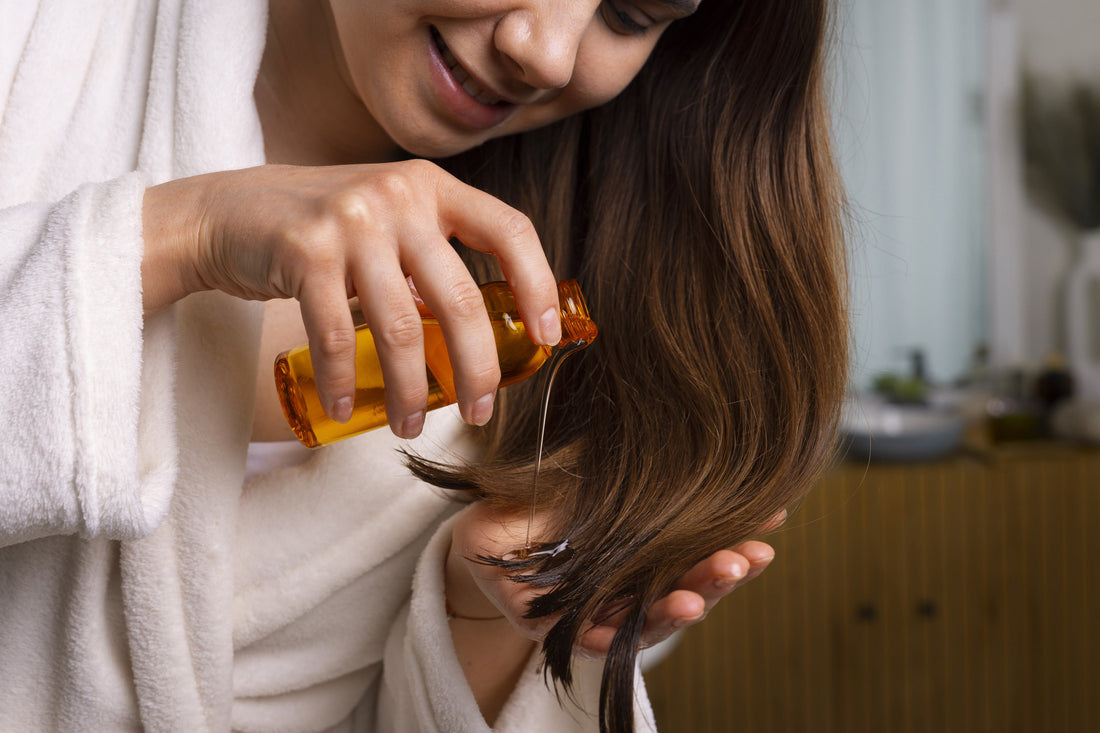
Exploring the Benefits of Essential Oils for Hair
Essential oils have been used for centuries as natural remedies for a variety of health and beauty concerns. When it comes to hair care, these oils offer incredible benefits, from promoting growth and reducing hair fall to improving shine and tackling scalp conditions. In this guide, we’ll explore the best essential oils for hair, their benefits, and how to use them effectively.
1. What Are Essential Oils?
Essential oils are concentrated extracts derived from plants. They contain powerful compounds that offer therapeutic benefits for both the scalp and hair.
Key Features:
- Extracted from flowers, leaves, bark, and roots.
- Known for their aromatic properties.
- Rich in nutrients that enhance hair health.
2. How Do Essential Oils Benefit Hair?
Essential oils address various hair concerns naturally. Here’s what they can do:
Benefits:
- Promote Hair Growth: Stimulate blood circulation to the scalp.
- Strengthen Roots: Nourish hair follicles with vitamins and minerals.
- Combat Hair Loss: Address underlying causes like stress and hormonal imbalance.
- Reduce Dandruff: Contain antifungal and antibacterial properties.
- Add Shine and Smoothness: Seal moisture and improve texture.
3. Best Essential Oils for Hair and Their Benefits
1. Rosemary Essential Oil
One of the most popular oils for hair growth, rosemary stimulates blood circulation and encourages healthy hair follicles.
How to Use:
- Mix a few drops with a carrier oil like coconut or olive oil.
- Massage into the scalp for 5-10 minutes.
- Leave for an hour before washing.
Benefits:
- Promotes hair regrowth.
- Reduces dandruff.
- Prevents premature graying.
2. Lavender Essential Oil
Lavender soothes the scalp, improves blood flow, and encourages hair growth while calming the mind.
How to Use:
- Add 3-4 drops to your shampoo or conditioner.
- Use in a hot oil treatment with almond oil.
Benefits:
- Reduces hair fall.
- Moisturizes the scalp.
- Relieves stress-related hair loss.
3. Tea Tree Essential Oil
Tea tree oil is known for its antibacterial and antifungal properties, making it ideal for dandruff and scalp infections.
How to Use:
- Mix 2-3 drops with aloe vera gel.
- Apply to the scalp and leave for 30 minutes before rinsing.
Benefits:
- Treats itchy, flaky scalp.
- Unclogs hair follicles.
- Promotes a healthy scalp environment.
4. Peppermint Essential Oil
Peppermint provides a cooling sensation, stimulates blood circulation, and promotes hair growth.
How to Use:
- Combine with a carrier oil and massage into the scalp.
- Add a few drops to your shampoo.
Benefits:
- Stimulates hair follicles.
- Improves scalp health.
- Adds volume and shine.
5. Argan Oil Infused with Essential Oils
While not an essential oil itself, argan oil works well as a carrier for essential oils, enhancing their absorption.
How to Use:
- Mix 2 drops of your favorite essential oil with argan oil.
- Use it as a leave-in conditioner.
Benefits:
- Reduces frizz.
- Adds softness.
- Protects against environmental damage.
4. How to Use Essential Oils for Hair
1. Scalp Massage
- Mix 2-3 drops of essential oil with a carrier oil (like coconut or jojoba).
- Massage gently into the scalp for 5-10 minutes.
- Wash off with a mild shampoo.
2. Hair Mask
- Combine essential oils with ingredients like yogurt, honey, or avocado for a nourishing mask.
- Leave on for 20-30 minutes before rinsing.
3. Hot Oil Treatment
- Warm a mixture of essential and carrier oils.
- Apply to hair and scalp, cover with a shower cap, and let it sit for 30 minutes.
5. Safety Tips When Using Essential Oils
Essential oils are potent and must be used with care.
Precautions:
- Dilute Before Use: Always mix essential oils with a carrier oil.
- Do a Patch Test: Test for allergies on a small area of skin before use.
- Avoid Overuse: Excessive use can lead to irritation.
- Keep Away from Eyes: Essential oils can cause discomfort if they enter the eyes.
6. DIY Essential Oil Blends for Hair
1. Growth-Boosting Blend
- 3 drops rosemary oil.
- 2 drops peppermint oil.
- 1 tablespoon coconut oil.
How to Use: Massage into the scalp and leave overnight.
2. Anti-Dandruff Blend
- 2 drops tea tree oil.
- 2 drops eucalyptus oil.
- 1 tablespoon jojoba oil.
How to Use: Apply to the scalp and leave for 30 minutes before washing.
7. FAQs
1. Can essential oils be used on all hair types?
Yes, essential oils are suitable for all hair types, but choose oils based on your specific needs (e.g., dry, oily, or damaged hair).
2. How often should I use essential oils for hair?
Use them 2-3 times a week for best results.
3. Can I mix multiple essential oils?
Yes, blending oils can enhance their benefits, but ensure proper dilution.
4. Are essential oils safe for color-treated hair?
Yes, most essential oils are safe, but always perform a patch test.
5. What is the best carrier oil to use with essential oils?
Popular options include coconut oil, argan oil, jojoba oil, and almond oil.
6. Can essential oils promote faster hair growth?
While they improve scalp health and stimulate follicles, the results depend on consistency and individual factors.
Harnessing the power of essential oils can transform your hair care routine naturally. With their ability to nourish the scalp, strengthen strands, and promote growth, these oils are a must-have for healthy, vibrant hair.
